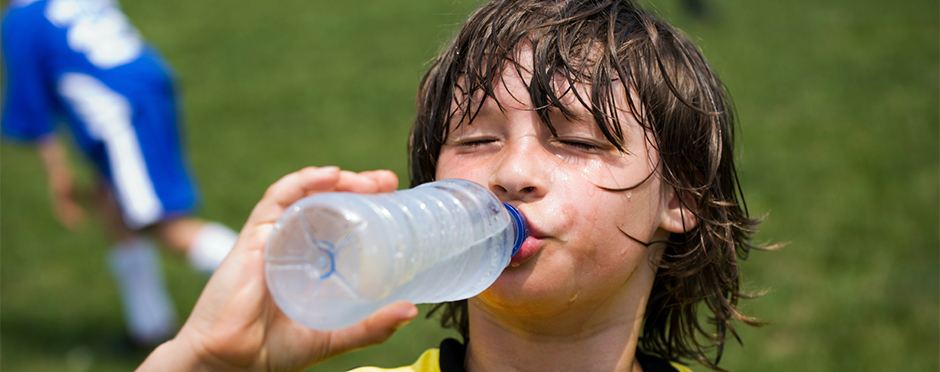
Hydrating for Performance and Health
2 CommentsAt first, hydration might seem like a dry topic, but there is more to it than just drinking water. Many people may not realize that hydration levels can affect everything from essential bodily functions to your mental and physical performance levels, making it an ideal topic to cover with hordes of athletes returning to their sports this week.
Performance and Muscle Function
Athletes may be interested in the fact that improper hydration has been linked to a decline in performance. A recent study examined the effect water loss had on basketball players. It turns out that after 2% of your body weight in water is lost, your performance will begin to decline. Athletes who were not properly replacing water had slower drill times and missed more shots than when hydrated. While we’re on the topic of performance, fluid is integral to normal muscular function while competing. Loss of fluids via sweat can be a contributing factor to muscle cramps, which will take even the toughest athletes out of the game. Cramps will leave you temporarily sidelined and tend to return with any more activity over the short term, so it’s best to avoid them in the first place. Your body also utilizes water to help dissipate heat and if that ability is lost, you can easily succumb to heat illness – a very serious spectrum of heat-related health consequences that require immediate medical intervention.
Your Sweat Rate
Seeing how important hydration is to your health and performance probably has you wondering how much water you should drink. A good rule of thumb from the American Dietetic Association is to have about 2-3 ml of water per pound of body weight an hour before your activity is a good start. That means that a 20 oz bottle of water would be a good start for anyone up to about 200 pounds. Recommendations for continuing to hydrate during an event, however, are difficult as everyone’s needs are unique, but there is an answer. In an ideal world, everyone would know their sweat rate. If you have the time, weigh yourself before and after a hard workout. Your difference in weight (minus any water you drank) divided by the amount of time you worked out will give you a good estimate of your sweat rate, or how much fluid you lose while working out.
The Hydration Urine Chart
If you haven’t figured out your sweat rate, your next best clue as to your hydration status would be to look at your urine. It might seem like a crude way to monitor your hydration, but it’s fairly accurate. As you become more dehydrated, your urine gets darker. The chart below can be used to determine your hydration level. Urine that’s darker than the third bar from the top (or the lack of a need to urinate) is a sign to begin hydrating more aggressively until your urine is in the lighter area.
Hydration and Electrolytes
Now that you’re a little more familiar with hydration’s importance and determining your needs, it’s time to talk about how to properly hydrate. For most people, drinking plain water will meet your needs. If water’s too boring for you, try adding some fruit or other flavoring to keep your palette satisfied. One thing to consider is that as your body sweats, in addition to losing water, you begin losing electrolytes – minerals in the body that are essential to keep it functioning properly. For shorter bouts of exercise, electrolytes can be replaced at your next meal, but for longer exercise periods, they may need to be replaced mid-workout. The easiest way to do this is with sports drinks or coconut water. There are a lot of sports drinks and coconut water options out there, so it’s worth your time and money to experiment and see which drinks work best for you…plus it’s a good excuse to try out the wide array of flavors available. No matter what drink you prefer to use, it’s going to be tough to comfortably drink at your sweat rate, but keeping that rate in mind can help you stave off dehydration for a longer period of time.
As you can see, staying hydrated isn’t exactly the flashiest aspect of sports medicine, but it is one of the most important. Hopefully you now realize how taking the time to figure out your sweat rate, paying attention to your hydration levels, and choosing appropriate beverages during athletics can have a significant impact on your performance and health.
The Athletico blog is an educational resource written by Athletico employees. Athletico bloggers are licensed professionals who abide by the code of ethics outlined by their respective professional associations. The content published in blog posts represents the opinion of the individual author based on their expertise and experience. The content provided in this blog is for informational purposes only, does not constitute medical advice and should not be relied on for making personal health decisions.

2 Comments
Jeff Burpee
Thanks for this refresher information. As I get older, now 52, I have more and more difficulty staying ahead of the hydration issue. I sweat out more than I can ingest during my longer runs. On my last 16 mile run, I went through a gallon of fluids and still cramped up and had to walk at mm 13. It was a breezy semi-humid morning.
Any recommendations?
Jeff Burpee
Cincinnati, Ohio
Ted
You may have a low body water percentage before you do a run. Buy a smart scale that will show you body water percentage in addition to body fat, body mass in index, etc. You can monitor body water percentage daily to ensure you are properly hydrated.